 "A fish out of water" describes someone feeling uncomfortable or out of place in a new or unfamiliar situation. Originating from the literal inability of a fish to survive outside of water, the phrase metaphorically signifies the struggle individuals face when they lack familiarity or competence in a specific context. It emphasizes the importance of being in one's element and the challenges of adapting to new environments or roles. Whether in professional settings, social situations, or personal challenges, feeling like "a fish out of water" underscores the need for adaptation and support to navigate effectively.
"A fish out of water" describes someone feeling uncomfortable or out of place in a new or unfamiliar situation. Originating from the literal inability of a fish to survive outside of water, the phrase metaphorically signifies the struggle individuals face when they lack familiarity or competence in a specific context. It emphasizes the importance of being in one's element and the challenges of adapting to new environments or roles. Whether in professional settings, social situations, or personal challenges, feeling like "a fish out of water" underscores the need for adaptation and support to navigate effectively.
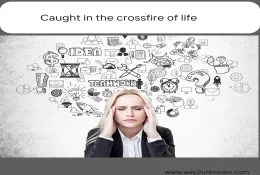 “Caught in the crossfire” means being unintentionally involved in a conflict between others. It’s like being stuck in the middle of an argument or fight that you didn’t choose to be part of. This idiom shows how someone can be affected by a dispute they have no control over.
“Caught in the crossfire” means being unintentionally involved in a conflict between others. It’s like being stuck in the middle of an argument or fight that you didn’t choose to be part of. This idiom shows how someone can be affected by a dispute they have no control over.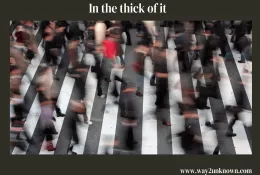 “In the thick of it” means being deeply involved in a challenging or intense situation. It’s like being right in the middle of a complex or difficult circumstance, where you need to focus all your attention and effort to deal with it effectively. People in this situation may feel overwhelmed or stressed due to the intensity of what they’re dealing with. It’s about being fully engaged and committed to addressing the challenges at hand with determination and resilience.
“In the thick of it” means being deeply involved in a challenging or intense situation. It’s like being right in the middle of a complex or difficult circumstance, where you need to focus all your attention and effort to deal with it effectively. People in this situation may feel overwhelmed or stressed due to the intensity of what they’re dealing with. It’s about being fully engaged and committed to addressing the challenges at hand with determination and resilience. 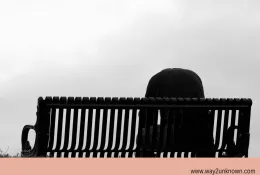 “Down on one’s luck” means experiencing a period of misfortune or bad luck in life. It describes a situation where things are not going well, leading to feelings of helplessness and frustration.
“Down on one’s luck” means experiencing a period of misfortune or bad luck in life. It describes a situation where things are not going well, leading to feelings of helplessness and frustration.  Being “in a funk” means feeling down or in a bad mood. It’s like being gloomy, unmotivated, or emotionally low. People can get into a funk due to stress, disappointment, or just feeling off. When in a funk, it’s hard to enjoy things and easy to feel irritable.
Being “in a funk” means feeling down or in a bad mood. It’s like being gloomy, unmotivated, or emotionally low. People can get into a funk due to stress, disappointment, or just feeling off. When in a funk, it’s hard to enjoy things and easy to feel irritable. "Sowing wild oats" describes a phase in someone's youth characterized by adventurous and often reckless behavior, especially in relationships and social experiences. The phrase originates from agriculture, likening youthful exploration to sowing seeds. It suggests a period of experimentation and self-discovery before settling into more stable adult responsibilities. The expression can carry both positive connotations of growth and learning, as well as negative implications of irresponsibility or hedonism.
"Sowing wild oats" describes a phase in someone's youth characterized by adventurous and often reckless behavior, especially in relationships and social experiences. The phrase originates from agriculture, likening youthful exploration to sowing seeds. It suggests a period of experimentation and self-discovery before settling into more stable adult responsibilities. The expression can carry both positive connotations of growth and learning, as well as negative implications of irresponsibility or hedonism. "Under the weather" is an idiom used to describe feeling ill or unwell, typically due to minor ailments like colds or headaches. The phrase suggests a temporary condition rather than a serious illness. Its origin is believed to be nautical, referring to sailors who were sent below deck to recover from sickness. In modern usage, it politely acknowledges someone's discomfort and the need for rest and recovery.
"Under the weather" is an idiom used to describe feeling ill or unwell, typically due to minor ailments like colds or headaches. The phrase suggests a temporary condition rather than a serious illness. Its origin is believed to be nautical, referring to sailors who were sent below deck to recover from sickness. In modern usage, it politely acknowledges someone's discomfort and the need for rest and recovery. "Go with the flow" means adapting to circumstances as they arise rather than trying to control every situation. It suggests a relaxed and flexible approach to life, embracing spontaneity and change. This concept aligns with philosophical ideas like Taoism's "wu wei," which emphasizes harmony with the natural order. Adopting this mindset can lead to greater resilience, reduced anxiety, and a smoother navigation through life's challenges.
"Go with the flow" means adapting to circumstances as they arise rather than trying to control every situation. It suggests a relaxed and flexible approach to life, embracing spontaneity and change. This concept aligns with philosophical ideas like Taoism's "wu wei," which emphasizes harmony with the natural order. Adopting this mindset can lead to greater resilience, reduced anxiety, and a smoother navigation through life's challenges. "A drop in the ocean" is an idiom that describes a very small and seemingly insignificant contribution compared to the vastness of the entire issue. It highlights the disparity between minor efforts and the larger problems they aim to address, suggesting a negligible impact. However, it also implies that cumulative small efforts can lead to significant change, much like an ocean is made up of countless drops. This dual perspective is relevant in areas such as environmental conservation and social activism, where individual contributions collectively make a meaningful difference.
"A drop in the ocean" is an idiom that describes a very small and seemingly insignificant contribution compared to the vastness of the entire issue. It highlights the disparity between minor efforts and the larger problems they aim to address, suggesting a negligible impact. However, it also implies that cumulative small efforts can lead to significant change, much like an ocean is made up of countless drops. This dual perspective is relevant in areas such as environmental conservation and social activism, where individual contributions collectively make a meaningful difference.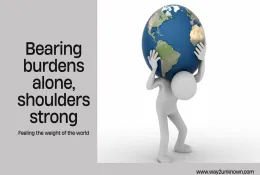 The Idiom highlights the feeling of being weighed down by worries or problems to the extent that it feels like an enormous, unmanageable burden. It conveys the sense of being overwhelmed by the challenges one faces and the emotional toll it takes on an individual.
The Idiom highlights the feeling of being weighed down by worries or problems to the extent that it feels like an enormous, unmanageable burden. It conveys the sense of being overwhelmed by the challenges one faces and the emotional toll it takes on an individual. The Idiom conveys a sense of being in a difficult or risky situation where the individual may feel out of their depth and unsure of how to proceed. It can serve as a warning to recognize one’s limitations and seek help or guidance when necessary to avoid potential negative consequences.
The Idiom conveys a sense of being in a difficult or risky situation where the individual may feel out of their depth and unsure of how to proceed. It can serve as a warning to recognize one’s limitations and seek help or guidance when necessary to avoid potential negative consequences.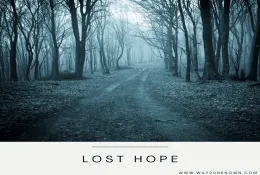 Overall, the idiom “in a dark place” serves as a metaphor for being in a state of emotional darkness, where one’s thoughts and feelings are clouded by negativity or distress.
Overall, the idiom “in a dark place” serves as a metaphor for being in a state of emotional darkness, where one’s thoughts and feelings are clouded by negativity or distress. 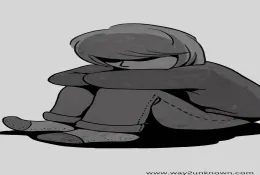 Overall, calling someone a “sad sack” is a way to describe their demeanor or attitude as consistently sad or disheartened. It’s important to remember that everyone has their ups and downs, but being labeled a “sad sack” usually implies a more persistent state of melancholy.
Overall, calling someone a “sad sack” is a way to describe their demeanor or attitude as consistently sad or disheartened. It’s important to remember that everyone has their ups and downs, but being labeled a “sad sack” usually implies a more persistent state of melancholy. "Hit the hay" is a colloquial expression meaning to go to bed or to sleep. It originated from the practice of farmers preparing their beds of hay by hitting it before resting. The phrase is used informally to convey the intention to retire for the night or take a nap. It reflects a casual and universally understood way to indicate bedtime or the need for rest after a day's activities.
"Hit the hay" is a colloquial expression meaning to go to bed or to sleep. It originated from the practice of farmers preparing their beds of hay by hitting it before resting. The phrase is used informally to convey the intention to retire for the night or take a nap. It reflects a casual and universally understood way to indicate bedtime or the need for rest after a day's activities. "A fish out of water" describes someone feeling uncomfortable or out of place in a new or unfamiliar situation. Originating from the literal inability of a fish to survive outside of water, the phrase metaphorically signifies the struggle individuals face when they lack familiarity or competence in a specific context. It emphasizes the importance of being in one's element and the challenges of adapting to new environments or roles. Whether in professional settings, social situations, or personal challenges, feeling like "a fish out of water" underscores the need for adaptation and support to navigate effectively.
"A fish out of water" describes someone feeling uncomfortable or out of place in a new or unfamiliar situation. Originating from the literal inability of a fish to survive outside of water, the phrase metaphorically signifies the struggle individuals face when they lack familiarity or competence in a specific context. It emphasizes the importance of being in one's element and the challenges of adapting to new environments or roles. Whether in professional settings, social situations, or personal challenges, feeling like "a fish out of water" underscores the need for adaptation and support to navigate effectively.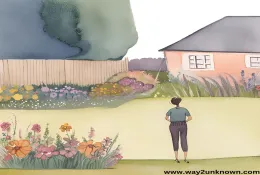 "The grass is always greener on the other side" is a proverbial saying that reflects the tendency to believe others' situations are better than one's own. It originates from the optical illusion that distant grass appears greener than nearby grass. The expression warns against constant comparison and encourages contentment with one's current circumstances. It promotes gratitude and perspective, reminding us to value what we have rather than always longing for perceived advantages elsewhere.
"The grass is always greener on the other side" is a proverbial saying that reflects the tendency to believe others' situations are better than one's own. It originates from the optical illusion that distant grass appears greener than nearby grass. The expression warns against constant comparison and encourages contentment with one's current circumstances. It promotes gratitude and perspective, reminding us to value what we have rather than always longing for perceived advantages elsewhere. "Barking up the wrong tree" is an idiom that means pursuing a mistaken or misguided course of action. It originates from hunting dogs barking at the base of a tree, wrongly believing their prey is there. The phrase highlights the futility of certain efforts and encourages reassessment of strategies. Recognizing when we are "barking up the wrong tree" helps redirect efforts towards more effective solutions.
"Barking up the wrong tree" is an idiom that means pursuing a mistaken or misguided course of action. It originates from hunting dogs barking at the base of a tree, wrongly believing their prey is there. The phrase highlights the futility of certain efforts and encourages reassessment of strategies. Recognizing when we are "barking up the wrong tree" helps redirect efforts towards more effective solutions. In essence, the idiom “hit a snag” highlights the inevitability of facing obstacles or challenges along the way and emphasizes the importance of staying adaptable and proactive in finding solutions to move past the hindrance.
In essence, the idiom “hit a snag” highlights the inevitability of facing obstacles or challenges along the way and emphasizes the importance of staying adaptable and proactive in finding solutions to move past the hindrance.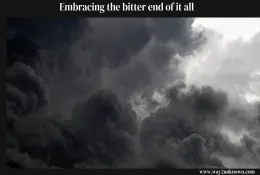 Overall, the idiom “a bitter end” encapsulates the notion of an unfortunate or distressing conclusion to a situation, highlighting the emotional weight and challenges that come with such endings.
Overall, the idiom “a bitter end” encapsulates the notion of an unfortunate or distressing conclusion to a situation, highlighting the emotional weight and challenges that come with such endings.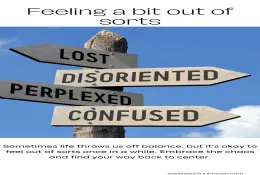 When someone is “out of sorts,” it means they’re feeling a bit unwell or not quite themselves, like being in a slightly bad mood or feeling off. It’s a state where you’re not at your usual level of energy or mood.
When someone is “out of sorts,” it means they’re feeling a bit unwell or not quite themselves, like being in a slightly bad mood or feeling off. It’s a state where you’re not at your usual level of energy or mood. 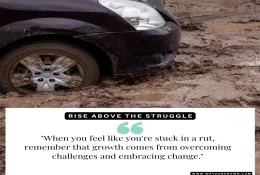 When someone is “stuck in a rut,” it means they’re in a situation where they’re not making progress or experiencing any change. It’s like being trapped in a pattern that’s not leading to growth.
When someone is “stuck in a rut,” it means they’re in a situation where they’re not making progress or experiencing any change. It’s like being trapped in a pattern that’s not leading to growth.